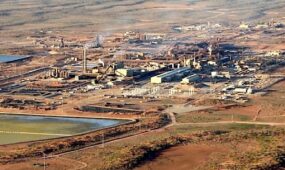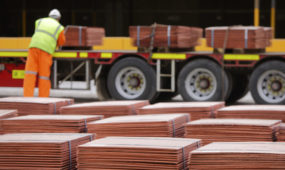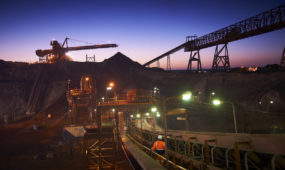Citizen driven governing to shape nuclear waste future
Mining & Resources

Sign up to receive notifications about new stories in this category.
Thank you for subscribing to story notifications.
IN the 6th Century BC, democracy was born when citizens in Athens were given the right to directly participate in the political arena.
Now more than 2500 years later, an Australian state 14,000km from Greece is using a jury of its citizens to help guide a decision on one of the modern world’s most pressing issues: what to do with the world’s nuclear waste.
South Australian Premier Jay Weatherill launched a study in February 2015 to explore the uranium-rich state’s involvement in the mining, enrichment, energy and storage phases for the peaceful use of nuclear energy.
The findings of this study, conducted by a Royal Commission, were handed down in May 2016.
This weekend (25-26 June) a 50-strong Citizens’ Jury in South Australia will convene for the first of two weekend-long meetings to discuss the Royal Commission’s findings before producing a report on its deliberations.
A second Citizens’ Jury, featuring a further 300 participants will meet in October following dozens of forums at shopping centres and events to gather feedback from the community across metropolitan, regional and remote South Australia.
This larger group of 350 will evaluate all the community feedback generated during the consultation process.
This report will essentially summarise the community view and be a “companion document” to the Royal Commission’s Final Report.
It is not the first time a Citizen’s Jury has been convened in South Australia. However, participants have never before been asked to consider such a major issue of global importance. Previous juries have come together to look at dog and cat management laws, how bicycles and cars can better share the roads and creating a safer, more vibrant Adelaide nightlife.
Weatherill told the South Australian Press Club this month the process reflected the “debate and decide” approach to governing.
“This model is being applied to many aspects of my Government’s work – not only the nuclear question – and is something I’m happy to be judged against daily,” he said.
According to the government’s Your Say website, Citizens’ Juries “aim to change the way democracy is done in South Australia, creating a new balance between experts and the public and giving elected representatives confidence that public judgment (rather than opinion) contributes to better decision-making.”
More than 1100 South Australians registered interest in being chosen for the initial 50-person Citizens’ Jury on the nuclear fuel cycle.
“I see the process we’ve now set in place as an opportunity to deal with the specific and practical matter of deciding on the extent of our future role in the nuclear fuel cycle,” Weatherill said.
“I also see it as a chance to enhance our democracy more generally – to show that people do have a role in shaping policy and setting the direction for the state, that they do have a voice, and that they will be listened to.
“I sense a strong willingness among South Australians to take part in this fresh approach.”
In the final stage of the process, the State Government will carefully consider the report of Citizens’ Jury Two – along with the views of the broader community – and announce its response by the end of the year.
University of Adelaide Professor of Politics and International Studies Clem Macintyre said elements of the Citizen’s Jury had been taken from the notion of direct democracy as practised in Ancient Athens as opposed to the representative democracy that had served much of the English-speaking world for the past 800 years.
“Citizens’ juries can be really useful for discerning the mood of a community,” he said.
“But whether or not that should be binding is the big issue and my view would be that we elect parliaments to make decisions and be accountable for those decisions.”
Prof Macintyre said citizens’ juries were being used increasingly in several parts of the world as governments attempted to reconnect with an increasingly disaffected voting population.
“I think governments are recognising that gulf – the distance between the voter and the government – and are trying to appease some of their critics by going down this path,” he said.
“Not too many that I know of are doing it as formerly as South Australia but I think we’ll see more of it as time goes by.”
Prof Macintyre said if the jury’s recommendations were ignored by the government following the process then “the political cost could be immense”.
“What happens to the so-called verdict of the citizen’s jury and how that translates into policy is going to be very important to the reputation of how things like that are held.
“Governments are increasingly anxious to at least look like they are listening because the old forms of communication just don’t work in the same way anymore – we don’t go to public meetings, we don’t all read the same newspapers or watch the same television bulletins and the respect with which politicians are held is considerably diminished.”
The use of citizen juries in South Australia is part of the state government’s plan to reform democracy through 'deliberative democracy projects' where non-government organisations or business will work with the Government and the community to consider different policy issues.
The Nuclear Fuel Cycle Royal Commission released its initial findings in the state’s capital Adelaide in February, which showed a nuclear waste disposal facility in the South Australian outback would be safe, viable and highly profitable.
Commissioner Kevin Scarce, a former South Australian Governor, said although nuclear was an emotional subject, the process was one of science and facts and not driven by opinion and emotion.
“Any future moves to increase the state’s involvement in the nuclear fuel cycle should not proceed without social consent,” he said in February.
“South Australia is leading the nation in having this discussion.”
The findings were also welcomed by the Opposition Liberal Party.
“The Royal Commissioner has laid the ground work for a substantive community debate regarding the recommendations contained in the report,” State Liberal Leader Steven Marshall said.
“I look forward to the people of South Australia having their say about the future of the nuclear fuel cycle in our State.”
There is almost 400,000 tonnes of used nuclear fuel temporarily stockpiled across the globe waiting for a permanent storage solution.
South Australia has some of the world's largest uranium deposits. It has mined uranium since 1988 and is estimated to have more than 80 per cent of Australia’s and 25 per cent of the world’s uranium resources.
The Royal Commission found that generating nuclear power or enriching uranium in South Australia was currently not commercially viable.
Jump to next article



